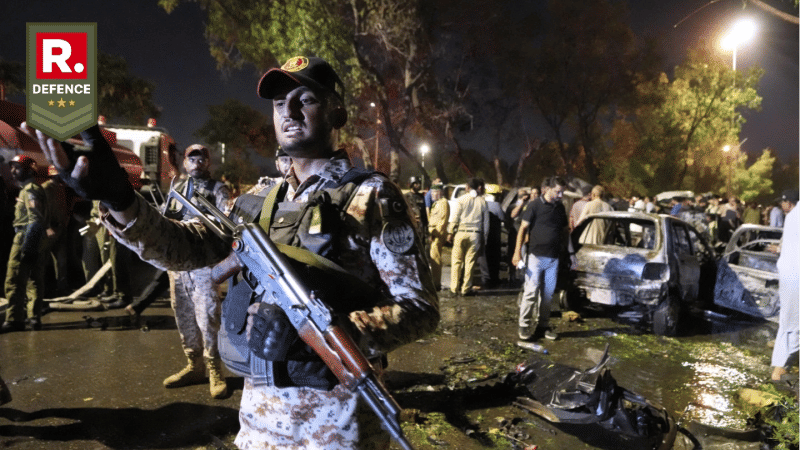Published 18:53 IST, January 6th 2025
47 Pakistani Soldiers Killed in Suicide Attack as Pakistan Army Faces Fierce Resistance on Multiple Fronts
A suicide attack claimed by the Baloch Liberation Army (BLA) near Turbat, Balochistan, has left 47 Pakistani security personnel dead and over 30 injured.

Islamabad, Pakistan - As Pakistan faces an intensifying insurgency in Balochistan, the situation on the ground is rapidly spiralling out of control. In a devastating blow to Pakistan’s security apparatus, a suicide attack claimed by the Baloch Liberation Army (BLA) has left 47 security personnel dead and over 30 injured. This attack, a ruthless reminder of the simmering unrest in Balochistan, highlights not just the growing resistance from Baloch separatist groups but also the wider failure of Pakistan’s military and political strategies in the region.
The attack, which targeted a convoy of military and police personnel near Turbat, is just the latest manifestation of the long-standing grievances of the Baloch people. Since the military began its heavy-handed operations in the region, Baloch nationalist groups have vowed to continue their fight for independence, and the Pakistani Army’s relentless attempts to suppress this resistance have only intensified the violence.
A Crisis of Pakistan’s Own Making
Pakistan's military, which has long relied on extremist groups and proxy warfare to assert its influence in the region, now finds itself ensnared by the very forces it once fostered. The insurgency in Balochistan is not just a response to Pakistani occupation and state brutality, but a product of Pakistan’s decades-long policies that have systematically ignored the aspirations of the Baloch people. By attempting to suppress dissent through military might and ignoring the political demands for autonomy and justice, Pakistan has fostered an environment of perpetual unrest.
The attack, coordinated with help from the BLA’s intelligence wing "ZIRAB," was meticulously planned and executed. The success of this operation sends a powerful message to Pakistan’s military establishment—Balochistan remains a hotbed of resistance, and no matter how many lives the military sacrifices, the Baloch will not yield. The more Pakistan cracks down, the more it fuels a determined insurgency that is becoming increasingly difficult to quell.
Escalating Threats from Multiple Directions
The growing insurgency in Balochistan is now compounded by Pakistan’s widening security challenges on multiple fronts. While the country grapples with the ever-increasing violence from the Tehrik-e-Taliban Pakistan (TTP), Pakistan's strategic failures in Afghanistan are becoming all too evident.

Despite once seeing the Afghan Taliban as an ally, Pakistan has found itself unable to leverage its influence over the Taliban regime. The recent airstrikes by Pakistan’s military in Afghanistan’s Paktika province—allegedly targeting TTP camps—have only strained relations with the Afghan Taliban, which continues to deny any involvement with the group. Worse, the Taliban’s refusal to cooperate with Pakistan on Baloch separatism and the TTP issue has left Pakistan with few options but to escalate its violent responses. Yet, such actions are backfiring, as they risk provoking further instability along its porous western borders.
The Shadow of Extremism
At the heart of Pakistan’s failure lies its history of promoting and empowering religious extremism, both domestically and in its foreign policy. The very proxies Pakistan once used to wage jihad against its neighbours have turned against the state. The TTP and Baloch separatists are no longer external threats; they are products of Pakistan’s own failed policies.

For decades, Pakistan has exploited militant groups as instruments of foreign policy—whether to challenge India, destabilize Afghanistan, or assert control over its restive regions like Balochistan. However, this strategy has now backfired spectacularly. The TTP and Baloch separatists, once seen as tools in Pakistan’s pursuit of strategic objectives, are now wreaking havoc within Pakistan itself. The military’s inability to confront its past misdeeds—such as the creation and nurturing of religious extremist groups—has led to a situation where these very groups have grown too powerful and too entrenched to be easily defeated.
An Army Weighing Down on Its Own People
The situation is particularly grim for Pakistan’s military, which has become the target of not only insurgents but also mounting public discontent. Social media platforms are rife with criticism of the military establishment, especially following the political crisis sparked by former Prime Minister Imran Khan’s ousting. Khan’s party, Pakistan Tehreek-e-Insaf (PTI), has succeeded in cultivating anti-army sentiment across the country, further fracturing an already polarized society.

This internal strife compounds Pakistan’s external security issues, as the military no longer commands the same degree of respect it once did. The inability to manage insurgencies in Balochistan and Khyber Pakhtunkhwa, coupled with growing frustration from both the public and its own armed forces, signals a deeper crisis within the institution. The Pakistani military, traditionally seen as the bedrock of the nation’s power, is now viewed by many as part of the problem rather than the solution.
A Dark Future for Pakistan?
With no clear strategy to address the underlying causes of Balochistan’s insurgency or to resolve tensions with the Afghan Taliban and the TTP, Pakistan’s future looks increasingly uncertain. The Baloch, having long suffered under state oppression, are resolute in their struggle for independence. The failure of Pakistan’s military to adequately address the demands of the people it governs only ensures that this conflict will continue to bleed the country dry.

The BLA’s statement following the attack underscores the grim reality for Pakistan: "Our land will always remain insecure for the occupying state, and we will not step down from our struggle until we achieve liberation." With every violent act, the resolve of Baloch separatists strengthens, while Pakistan’s military and political elite remain mired in an endless cycle of repression, violence, and denial.
The time has come for Pakistan to reflect on the fruits of its policies—extremism, repression, and proxy wars. Until Pakistan addresses the root causes of its internal conflicts, its future will remain as unstable as the region it seeks to control.
Updated 18:53 IST, January 6th 2025




